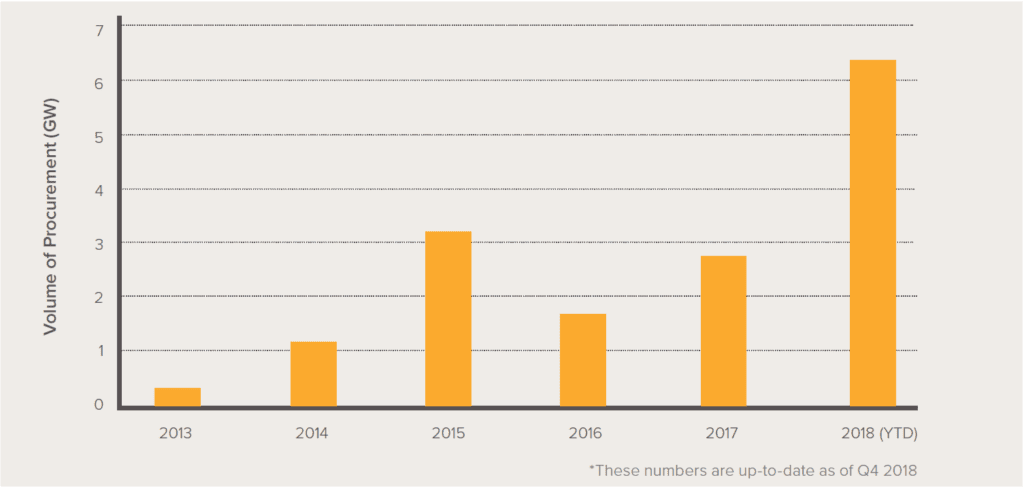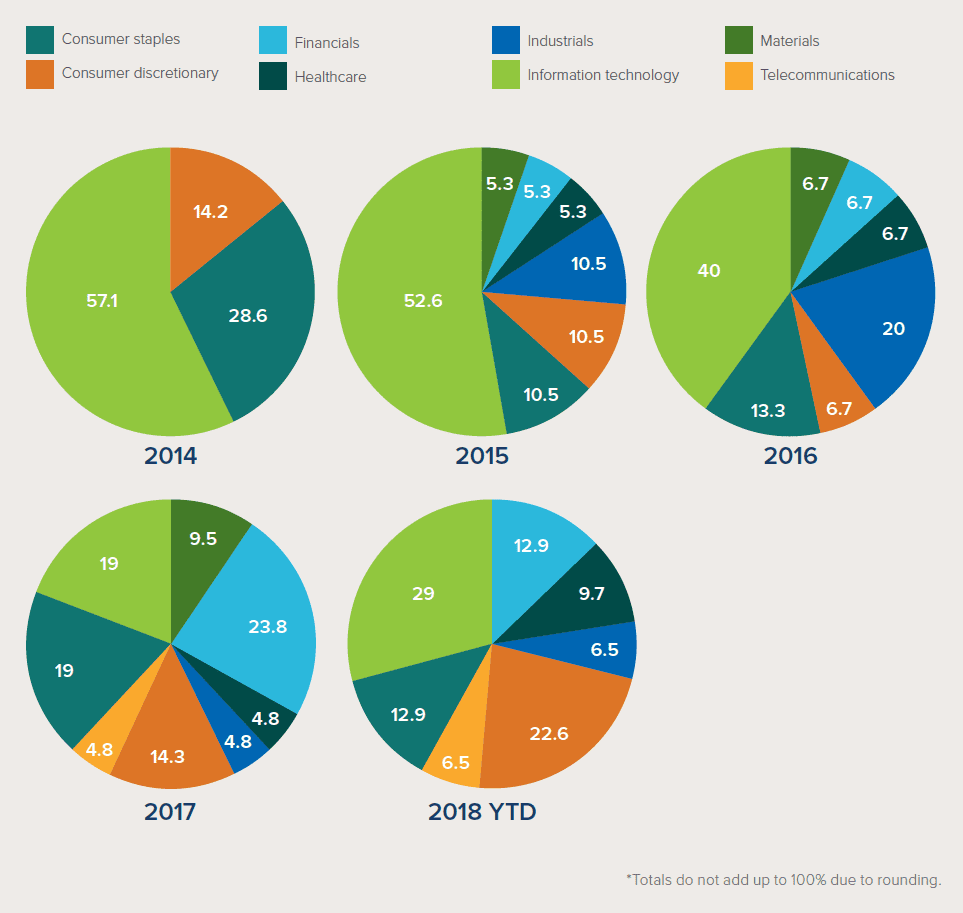
The Diversifying Corporate Renewable Market Needs a Broad Menu of Risk Mitigation Options
The corporate renewable energy procurement market has boomed in recent years but has remained stagnant in one respect. Most large-scale, off-site procurement is still done through one method—the power purchase agreement (PPA). A market with one major way to transact, no matter how good, can never sustainably expand. After all, the world is full of corporations with different risk tolerances, appetites, and constraints. As more corporations enter the market, the reliance on one way to allocate risk becomes a problem that is obvious if you consider Thai food.
One Dish Cannot Suit All Diners
Picture an ordinary hole-in-the-wall restaurant, the kind you wouldn’t think twice about as you passed it. Famished, you seat yourself and order the restaurant’s one specialty—Thai peanut chicken. The cook gets to work and the chicken’s aroma intensifies as it moves from the kitchen to your table. You dive into it and relish every bite, finally sitting back into your chair bearing a satisfied smile and a full stomach.
You bring a small group of friends over to the restaurant a few weeks later—all fans of Thai food and chicken. Their reactions are predictable—all of them leave raving about the peanut chicken and heaping praises on the restaurant.
Beaming with pride in your own good taste in food, you arrange a big group of 20 friends for a fun Friday night and shepherd your people to the restaurant. Everyone excitedly seats themselves, prepared for a night of great food and great company.
As you order Thai peanut chicken for everyone, though, you hear hushed whispers from the other end of the table—there is a problem. In your haste, you forgot to check for dietary restrictions. To your dismay, you discover that the group includes vegetarians, vegans, a pescatarian, and, a person with a peanut allergy.
As the evening progresses, the majority raves about the main dish while the minority survives on side dishes. One person in the group who has no dietary restrictions is unable to finish the meal because the chicken is too spicy.
You feel like an idiot.
It should have been obvious. A restaurant with just one specialty, no matter how good, can never cater to a large and diverse group of customers. It can never sustainably expand. After all, the world is full of people with different tastes, tolerances, and restrictions.
One Transaction Type Cannot Suit All Corporate Buyers
So, too, for corporate renewable procurement. It should be obvious that a market with one major way to transact, no matter how good, can never sustainably expand. After all, the world is full of corporations with different risk tolerances, appetites, and constraints.
The US corporate renewable market is no longer a hole-in-the-wall. This “restaurant” has brought online over 20 percent of all utility-scale wind and solar installed in the country in 2017. And as Figure 1 shows, 2018 has been a landmark year for the corporate renewables market. The market has seen over 6 gigawatts (GW) of renewable energy deal announcements in this year alone—more than the previous two years combined.
Figure 1: Corporate renewable energy procurement in the United States, 2013–2018 (as of 12/14/18)
Not only are more customers coming into this growing market, but those customers have diversified over the last few years. The IT sector continues to be a leader in the market (with 29 percent market share), but 2018 has seen the sustained participation of many other industries, including telecommunications, retail, manufacturing, and healthcare. This is reflected in Figure 2.
Figure 2: Distribution of sectors of corporate buyers (percentage)
However, the market’s menu of procurement options remains essentially the same. Even though a larger and more diverse group of corporate customers with a growing variety of risk profiles and appetites have been entering this market, we’re serving them the PPA in its original form—our very own Thai peanut chicken. The PPA, in its original form, has been and will continue to be a great way to transact and manage risk for some customers in this market—but not all of them.
Offering Different Ways for Buyers to Manage Risk as They Transact for Energy
Risk mitigation solutions have not kept pace with a rapidly diversifying and expanding corporate market. The issue of buyer risk has been raised with increasing frequency over the past few years, and the market must address this issue seriously and immediately.
The Business Renewables Center (BRC), a program of Rocky Mountain Institute, has explored how the market can satisfy this broadening set of risk appetites in a way that corporate buyers find accessible and easy to navigate. The results of this exploration are detailed in a new report, A Corporate Purchaser’s Guide to Risk Mitigation, which is available to the BRC’s members, and in its Executive Summary, which is available publicly.
The report dives into five specific risks that corporate buyers may not be familiar with: price, shape, basis, volume, and operational risks. It then reviews a range of mitigation strategies that are both widely available and just emerging in the market today—five within the construct of the VPPA and three outside it. The five VPPA strategies are hub-settled contracts, floors and collars, proxy generation, volume firming agreements, and fixed volume swaps. The three other strategies are long-term renewable energy certificate (REC) agreements, project tranches, and contract tranches.
Furthermore, the report explores the risk implications of these different mitigation structures through the lens of three archetypal buyers—a large IT firm with data centers across the country, a chain of coffee shops with a small and dispersed load, and a heavy manufacturing company with load concentrated in one region. The report concludes by highlighting best practices for buyers to contract off-site renewable power in a way that meets their risk priorities.
For buyers that want to understand the PPA in its original form, the BRC details the structure of the virtual PPA (VPPA) in a paper titled Introduction to the Virtual Power Purchase Agreement, available publicly. The VPPA is one of the dominant forms of corporate off-site procurement in the market today,
The market is changing. Corporate renewables have proven to be a force to be reckoned with and interest in carbon reduction strategies among corporations is strengthening with time. Buyers are continuing to seek competitive renewable procurement as the market scales in size and diversifies in the sectors from which its participants are drawn.
However, if we want the market for renewable energy to continue expanding with more corporate buyers, then—just as a restaurant must serve more than one dish—we must have options for a growing set of risk appetites and profiles.
We must move beyond the Thai peanut chicken.
You can read the Guide to Risk Mitigation’s Executive Summary here.

